The Samsung 850 EVO 4TB SSD Review
by Billy Tallis on July 11, 2016 10:00 AM ESTRandom Read Performance
The random read test requests 4kB blocks and tests queue depths ranging from 1 to 32. The queue depth is doubled every three minutes, for a total test duration of 18 minutes. The test spans the entire drive, which is filled before the test starts. The primary score we report is an average of performances at queue depths 1, 2 and 4, as client usage typically consists mostly of low queue depth operations.
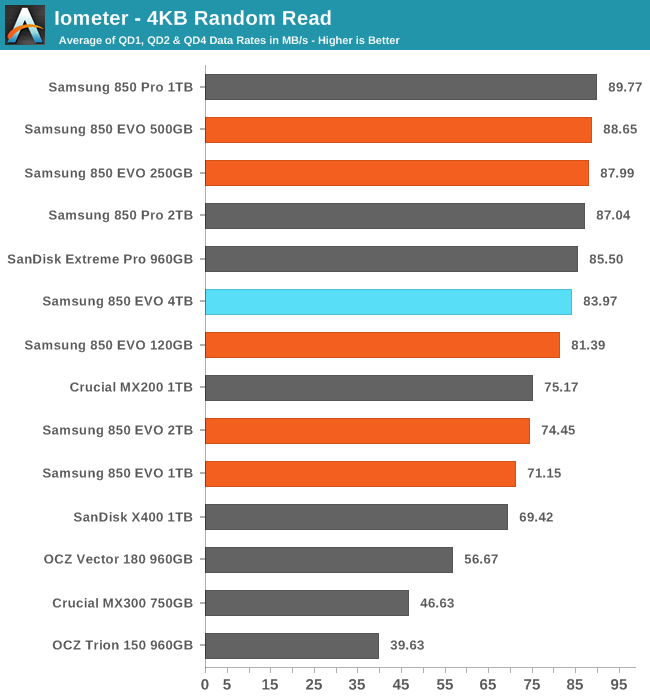
Random read performance of the 4TB 850 EVO is substantially better than the 1TB and 2TB 850 EVOs, but still not quite as fast as the best MLC drives or the 500GB and 250GB 850 EVOs.
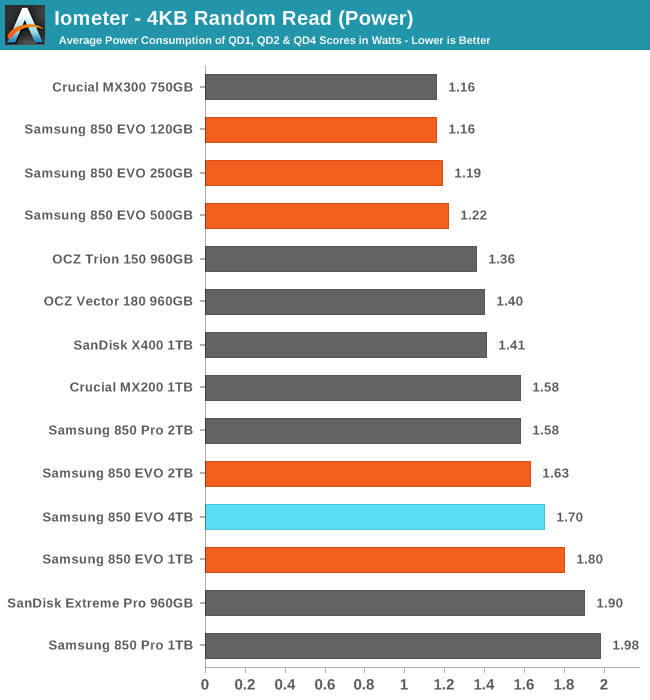
The power consumption of the 4TB 850 EVO is slightly higher than the 2TB model, but overall the efficiency is improved over the smaller drive with the same controller but older NAND.
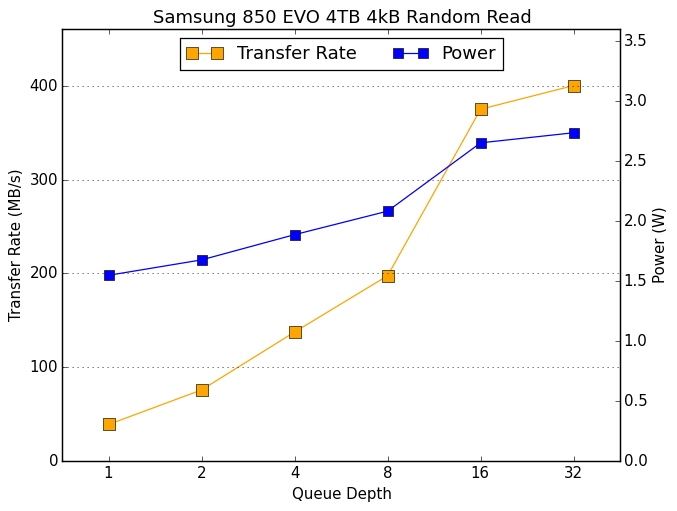 |
|||||||||
The scaling behavior of the 4TB 850 EVO is almost identical to the 2TB model, just with slightly higher performance and power consumption across the board.
Random Write Performance
The random write test writes 4kB blocks and tests queue depths ranging from 1 to 32. The queue depth is doubled every three minutes, for a total test duration of 18 minutes. The test is limited to a 16GB portion of the drive, and the drive is empty save for the 16GB test file. The primary score we report is an average of performances at queue depths 1, 2 and 4, as client usage typically consists mostly of low queue depth operations.
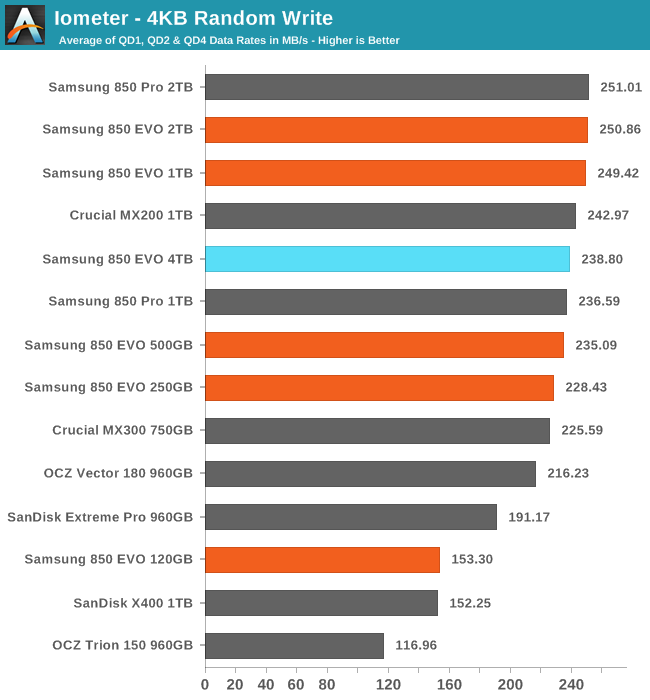
Random write speed for the 4TB 850 EVO is a little bit slower than for the 1TB and 2TB models, but still fast enough to beat almost all non-Samsung drives.
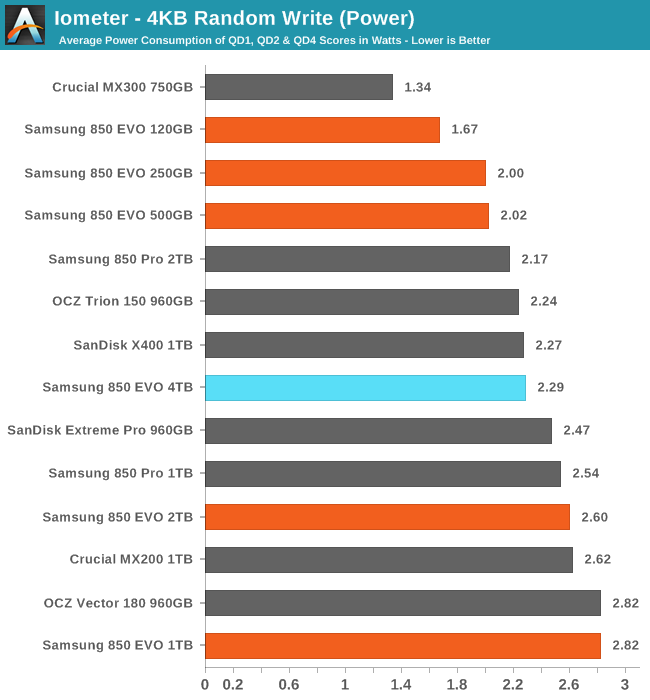
Power consumption of the 4TB 850 EVO is substantially better than the 1TB and 2TB counterparts, making it one of the most efficient large drives. The 750GB Crucial MX300 was still much more efficient.
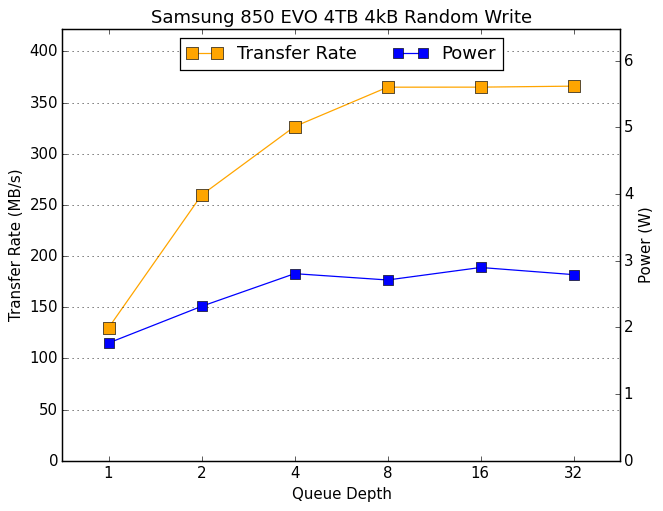 |
|||||||||
The lower performance score for the 4TB was apparently due to a regression in QD4 performance, where the 1TB and 2TB models were able to reach full speed but the 4TB needs a larger queue.










145 Comments
View All Comments
mapesdhs - Wednesday, July 13, 2016 - link
As long as they're able to sell the drives ok at current prices, it won't change. Indeed, if there's a demand spike then prices can rise, for all vendors (others catch on pretty quick if it's obvious consumers are willing to pay more than they'd estimated).This happened a few years ago when 256GB SSDs were just beginning to approach the 100 UKP mark for the first time. One particular store started offering Samsung 830 models for a good price (something like 120 each, I forget offhand), they sold *hundreds* of them in just a couple of weeks. No doubt Samsung realised there was simply no need to reduce the current pricing and infact it went back up very soon afterwards, as did other vendors' prices aswell, returning to 140 to 150 UKP levels by the following Spring.
mapesdhs - Wednesday, July 13, 2016 - link
Just checked, the 830 256GB offer price in late 2012 was 130 each (from ebuyer IIRC); I bought two. I think they sold well over a thousand units.jameskatt - Monday, July 11, 2016 - link
Why would I want to spend $1600 on a 4 TB SSD that only lasts 75 full drive rewrites? That limited drive life makes this an expensive disposable drive. The Samsung 850 Pro has a 10 year warranty. This 4TB 850 EVO won't even last a few years with its limited lifespan. It is useless for video work. You may end up losing valuable video if this dies suddenly.Notmyusualid - Tuesday, July 12, 2016 - link
Yes, this was my first thought too.I went back and checked the Anandtech article for the 850 Pro (rocking 512GB here), and it says 150TB of Endurance, whereas this has 300TB of endurance. Hmmm, the TLC thing still feels wrong to me. Both my 840 Evos performed SO horribly I got rid, and the 850 Pro just so different. And so,my SSD failures to date:
1 x OCZ Indillux shite thing. I'm sure you all remember that drive.
1 x Intel 160GB G1 (doa), replacement strong to this day.
1 x Kingston 60GB whatever
1 x Kingston 120GB whatever
2 x Patriot Wildfire 240GB each (failed ~18 months apart)
I also have an 840 Evo 500GB that I got for 'free', which is giving me no problems, but is used as a 'Steam' disk only, as I in no way trust TLC.
Make a 4TB Pro at $699, and I'll take two of 'em.
Impulses - Wednesday, July 13, 2016 - link
I've been pretty darn lucky... My desktop progression:80GB Intel X25-M
40GB Intel X25-V (for a netbook)
2x 128GB Samsung 830 (ran separately then later RAID)
2x 1TB Samsung 850 EVO + 256GB SM951
0 issues :P
mapesdhs - Wednesday, July 13, 2016 - link
It does vary hugely. I have lots of SSDs I use for benching & system testing, including several dozen OCZ (maybe 50 SSDs total). Only had two problems so far, a SanDisk that went weird during a fw update (which thankfully recovered after a full power disconnect) and a Samsung 840 250GB that went fubar last week for grud knows what reason (stops any system to which it's connected from booting properly). Ironic that I've had a Samsung fail before any of the OCZs I use.It probably helps that the first thing I do when receiving an SSD is make sure the fw is up to date, which in the case of my numerous Vertex2E/3s means they won't be affected by any earlier problematic bugs. Indeed, I've had several V2Es running in UNIX systems for years at a time with no problems (V2E is ideal for this as it was optimised for OSs that don't support TRIM, ie. back when XP was still common).
Notmyusualid - Tuesday, July 19, 2016 - link
I could also have added 1x Intel X25-E 64GB still going strong to this day too.Notmyusualid - Tuesday, July 19, 2016 - link
Sorry, I left out, make 'em at 4TB @ 699, and I'll not only take two of 'em, I'll RAID1 them! Given they are TLC...vladimirovich - Tuesday, July 12, 2016 - link
$1500 for this TLC shit, enjoy!! :)azrael- - Tuesday, July 12, 2016 - link
Isn't there an error in the specification chart? As far as I know only the lower capacity drives up to 500 GB use the MGX controller. The 1 TB drive uses the MEX controller. Unless something has changed...